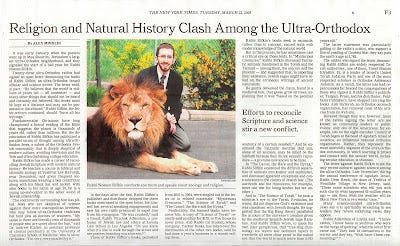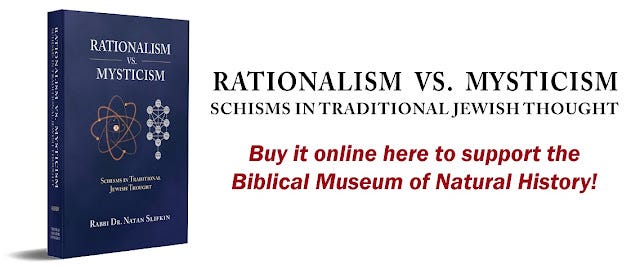Why Rationalism Vs. Mysticism (Probably) Won't Be Banned
In the previous post, I gave all the reasons why if my new book Rationalism vs. Mysticism is banned, as notoriously happened with three of my other books, it won't upset me. In this post, I will give the reasons why I don't think that this will happen. In the next post, I will give the reasons why it might still happen anyway.

So, why don't I think that Rationalism vs. Mysticism will be banned? Simple: All the ideas presented in it are backed up with powerful arguments and sources from respected traditional rabbinic authorities.
Just kidding! Obviously that doesn't make the slightest difference. Here are the real reasons:
1. I am no longer on the radar
The problematic books were written by Rabbi Nosson Slifkin, a charedi graduate of the Mir yeshiva. They had prestigious haskamos from charedi rabbonim and Gedolim. They were published by Targum Press and distributed by Feldheim Publishers. As such, they were read and taken seriously by people in the charedi world.
In contrast, this book was written by Rabbi Dr. Natan Slifkin, whose very name and title gives him away as a treif non-yeshivish academic Zionist (aside from being a person who has already been cast out anyway). It bears no haskamos, just blurbs from academic scholars of Jewish thought. It's privately published and is distributed online and in stores by Gefen Books. It's just not something that appear on the radar as a threat.
2. There is no "political" objective
Some of the key figures involved in the original ban didn't really care about the books at all. They had their sights on a greater trophy. As Rabbi Berel Wein told me, my mistake in getting haskamos was compounded by the much greater mistake of one particular haskamah that I received - that of Rav Shmuel Kamenetzky. Originally, I made the foolish mistake of thinking that such a prestigious haskamah would render the book immune to attack. Little did I realize that it had the exact opposite effect. Rav Shmuel has long been by far the most moderate and broad-minded of the charedi Gedolei Torah (a reputation sadly since tarnished by his opposition to vaccines), and hails from a family of similarly broad-minded Gedolei Torah; consequently, he has long been a target for extremist zealots. Having his haskamah in my books gave them a golden opportunity to delegitimize him. But no such political targets exist with my new book.
3. Most of the original zealots are no longer operational
The Gedolei Torah, rabbis and askanim involved in engineering the original ban are, for the most part, no longer operational. Rabbi Leib Pinter, after having been sentenced to (another) long stint in prison for fraud, has since been released, but is unlikely to wield the same influence. Rabbi Leib Tropper lost his Machiavellian power after he was secretly filmed taking advantage of women. Rav Yitzchak Shiner and Rav Elya Weintraub have passed away. Rav Moshe Shapiro has also passed away, and his zealotry was anyway discredited by his arrest for instructing one of his followers to break into the home of an old woman (that he mistakenly believed to be running a ritual abuse cult) and beat her to death. And I am told that some of the Bnei Brak zealots that were involved in the ban of my books had to flee after being involved in taking advantage of people with a financial scam. There just isn't the same team that there was originally.
4. The previous backlash and consequences shocked them
When the dozens of charedi Gedolei Torah signed on the ban of my books back in 2004, I doubt that they gave a second's thought to what the consequences could be (and they certainly didn't do any investigation!). Had they done so, they might still have decided that there wouldn't be any. All authors to have previously been banned simply folded. Nobody dared question the authority of the Gedolim. Even if there had been one or two previously banned figures that did not submit, they had no real way of defending their work, and nobody in the frum community rallied around them.
What happened with the ban on my books, on the other hand, was very different. First of all, I didn't fold. This was not merely because I knew that my books were not actually heretical, and I had the strength to maintain my convictions; it was because as a young person whose kids were not yet in the "system," I had the option of simply leaving that world. But not only did I hold my ground; I had a miraculous way of making my position known. The internet had arrived! I had a website, with a dedicated section for the controversy, which became the central information resource for everyone, since I presented all my opponent's statements - along with respectful rejoinders by myself and many other people. Countless thousands of people were looking at it! Never before had the target of a ban had such a way to influentially and powerfully present his position. And, of course, the calm, source-based responses by myself and my supporters were much more impressive than the hysterical condemnations by my opponents which lacked any real arguments. As Rav Aharon Feldman bitterly said to me: "You've successfully made fools of the Gedolim." (To which I countered that I hadn't done anything - they themselves were entirely responsible.)
But that wasn't all. I wasn't the only person with a website. It was the Golden Age of the Jewish blogosphere. There were many blogs that sprang up, and responses to the ban that circulated online. Some respectfully defended the approaches in my book with countless sources. Others challenged the authority and wisdom of the charedi Gedolim, some with sharp satire and great disrespect. Never before had the Gedolim had their authority challenged in such a way. They were used to delegitimizing others, not being delegitimized themselves. It was shocking for them.
And the blogs were just one manifestation of a larger phenomenon. When "Making of a Godol" was banned, it was just an attack on one person, Rav Nosson Kamenetzky. But when my books were banned, it was an attack on pretty much everyone who had ever adopted such approaches to reconciling Torah and science - which was many, many thousands of people. Suddenly the Gedolim were confronted with a backlash from countless people who were upset and infuriated, which they hadn't expected at all. It wasn't just Nosson Slifkin who believed in an age of dinosaurs and who used an approach from Rabbeinu Avraham ben HaRambam - it was many, many people. It was probably the biggest blow to charedi rabbinic authority ever - alas, recently eclipsed by the Covid fiasco.
Nor did it end with the frum community. The ban received widespread attention from the wider Jewish community and ultimately the non-Jewish world. It made all the Jewish newspapers worldwide, along with the Wall Street Journal and New York Times - and none of the coverage was complimentary. The charedi world does not like this kind of attention.
But there were consequences beyond a backlash. Whereas some people challenged the Gedolim, others simply chose to leave the charedi world. Hundreds (possibly thousands?) of people realized that the charedi world simply was not for them. They chose to align themselves with the Yeshiva University community, with centrist or Modern Orthodoxy, and in some sad cases they left religious Judaism altogether. Whatever harm the Gedolim believed that my books were causing was vastly eclipsed by the harm caused by the ban.
Finally, the backlash had serious financial consequences. To the dismay of the Gedolim and askanim, they discovered that among those horrified by the ban were some very wealthy and prominent philanthropists. These people pulled their support of the yeshivos whose roshei yeshivah had signed on the ban; some of them reduced their support for charedi causes altogether. One of them told me that he kept a copy of the ban on his desk, so he could check the names when collectors came. And since that time, I've forged personal connections with some of the biggest names in Jewish philanthropy.
Conclusion
For all these reasons, even though my new book is far more "controversial" than my previously banned books, it seems very unlikely that it will be banned. But in the next post in this series, I will give reasons why it might be banned anyway. Of course, if that does happen, it will sell out very quickly - so buy your copy now! (And remember, please do not buy it from Amazon!)
If you'd like to subscribe to this blog via email, use the form on the right of the page, or send me an email and I will add you. Please note that with the publication of this book, I have recently been even more swamped by email than usual, and so if you are writing to me about something, it will take me a while to respond.



